
Angus Fraser, photography.
“Several issues are at stake here: the state of education in America, the paralysis
of the critical faculty of students, the death of dissent, and the political orientation
of the American intelligentsia.”
Guido Giacomo Preparata
“The look of the past can be retrieved, preserved and disseminated in an unprecedented fashion. But awareness of history A an interpretation of the past succumbs to a faith in history as representation.”
Alan Sekula
“The love of the world is night.”
Jean de Fecamp
11th century
“I truly believe that the lack of adequate images is a danger… I have said that before and I repeat it again and again, and as long as I can speak I will speak out for that. If we do not develop adequate images we will die out like dinosaurs.”
Werner Herzog
The Super Bowl is the most watched television event of the year (112 million viewers this year), of every year. Advertisers pay more per minute for Super Bowl airtime than anywhere else. And increasingly the event has taken on a martial jingoistic flavor that is no doubt the biggest recruitment tool available for the U.S. armed services. The halftime show has grown in size, duration, and cultural importance with each passing year. But, this was also the year Hollywood cashed in on the story of traumatic brain injuries incurred by what is probably a clear majority of players (with the film Concussion). The NFL is a 12 billion dollar a year business, not counting the probably tens of millions made on secondary marketing sales. The league is 67% african american and 27% white. All the owners are white. The commissioner, Roger Goodell, is white. He makes 12 million a year in salary. OK, the halftime show has featured the likes of The Rolling Stones, Prince, The Who, Tom Petty, and U2. Performers are not paid for their services, but figure, you know, over a hundred million eyeballs is just good business. Which brings me to this years halftime show featuring Beyonce and Coldplay. Without belaboring the intrinsic value (or lack thereof) of the music, the performance of Beyonce included a *tribute* to the Black Panthers. Well, sort of. That there is even a discussion about this performance speaks to the poverty of cultural discourse today, but more, this was essentially dancers in Hot pants and berets (black mind you) forming an *X* on the field, and Beyonce herself in tight black leather with bandoliers criss crossing her chest. The ever parochial Deray McKesson praised what he saw in a tweet….“The #Formation shout-outs to Malcolm X & MJ were excellent.” Now, one can unpack all the many layers of signifiers in play here, but it is useful to recognize that NFL players, 70% black, are at high risk for CTE (Chronic Traumatic Encephalopathy) and that their careers are curtailed anyway by a variety of other injuries, and that this game, like all NFL games, is saturated with Pentagon and military propaganda and symbols; the same military that coerces poor kids to join as, essentially, cannon fodder for one or another imperialist aggression. And the Super Bowl takes place in various locations (this year San Francisco) which usually entails the displacing of homeless and poor, and a huge expenditure of public monies to pay for policing and traffic control.

Fred Eversley
There is no shortage of players. Injury risk or not. What does that tell you? It is a naked spectacle of American patriotic fervor — and at the center of it this year is a billionaire black singer, married to another billionaire black singer/producer/whatever, who appropriate images of dissent and repackage them, repurpose them, and in general are applauded for doing so. Their entertainment empire serves, among other things, the plantation system of the National Football League. And maybe even more dispiriting is the right wing media response to this halftime show, the Michelle Malkins and FOX News blondes who take great umbrage at this insult to American law enforcement, or something (I mean who knows, really). The point is that a good deal of time was spent, in mass media, dissecting this trivia. People actually *cared*. And yet, scarcely a mention of the Panthers or what they actually stood for and accomplished. As Ron Jacobs put it…
“The Black Panthers were arguably the most important revolutionary organization in the United States in the late 1960s and early 1970s. Their presence was an inspiration to millions of men and women around the globe, especially those living in colonial and neocolonial situations. Furthermore, the Party was a key element in the movement in the United States against imperialism and its manifestations of war and racism.”

Tereza Zelenkova, photography.
What struck me is something else. For most of the social media commentary I read was along the lines of either what a revolutionary feminist Beyonce was, or the ‘dont be a hater, its great visibility for black people’, or just a general refusal to critique something that is *entertainment*. In other words, there is increasingly a dismissal of even pop culture as something worthy of analysis. It was less that people refused to ‘hate on’ a favorite pop star but more that criticism itself was unpalatable. And the massively popular are now officially immune to any form of criticism or judgement.
“The truth being that nearly everyone seems agreed that the so-called Liberal age, this celebrated time of democracy and freedom dating from the Industrial Revolution, has not merely failed, but, in fact, has never existed as such. The advent of technique, markets, business, and consumerism did not herald the dawn of an era of freedom but rather the overwhelming mechanization of production and of the exercise of power, which has remained dynastic. “
Guido Giacomo Preparata
If a minor black female singer, a non-celebrity, mounted a performance identical to Beyonce, she would have been, I am pretty sure, heatedly attacked. For she would have no right to sample history, black or otherwise. Royalty sample and wear what they want. In the U.S. royalty is gauged on a monetary scale. Beyonce and Jay Z. are wildly rich. Ergo, they are sort of the black Kennedys now.

Harry Thullier, photography.
Ajamu Baraka perhaps offered the most cogent analysis….
“In an era where the image is dominant and meaning fluid, what is still real, concrete and observable is the operation of power. Situated and controlled by an elite that bell hooks refers to as the White Male, capitalist Patriarchy, it’s a power that exercises with devastating efficiency its ability to shape consciousness through its control of the major means of communication and cultural production. It was those white men and their representatives that placed Beyoncé on that stage at the Super Bowl. It is incredibly naive to think that anything subversive or even remotely oppositional to the interests of the capitalist oligarchy would be allowed expression on a stage that it controlled.”
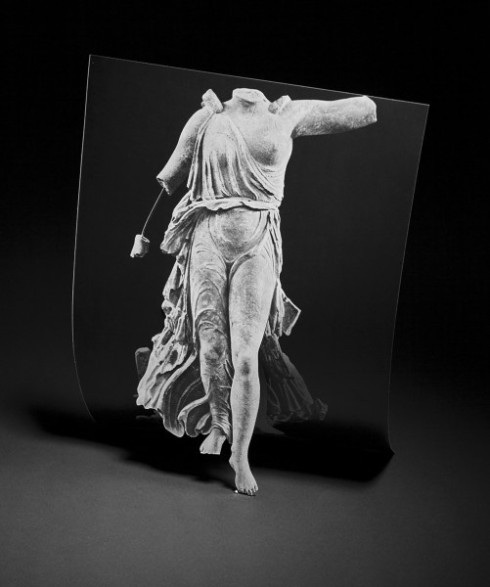
Michael Etzensberger, photography.
There are indications in all this that seem to reflect a loss of not just memory, but introspection. Russell Jacoby said “Society has lost its memory, and with it, its mind. The inability or refusal to think back takes its toll in the inability to think.” And then added…“Freudian concepts exposed the fraud of the existence of the “individual.” To be absolutely clear here: the Freudian concepts expose the fraud, not so as to perpetuate it, but undo it. That is, unlike the mechanical behaviorists, the point was not to prove that the individual was an illusion; rather it was to show to what extent the individual did not yet exist.” It is easy, I think, to forget that the consciousness of men in antiquity was one of, comparatively, deep introspection. Often this was tied to Church dogma, but it was seen as rather perverse not to reflect on the world around you. This took on acute qualities of guilt, of course. For that is the Western psyche, and part of what separates it from Asian, Buddhist, or Hindu or Islamic sensibilities. The Christian West is also the Judaic west.
“Of all that moves and breathes, nothing is more wretched than man.” Which is Homer, but which was a favorite quote of Plutarch. As Jean Delumeau observed, the entire middle ages revolved around the idea of life on earth forming a kind of prison, a sentence that one had to serve for guilt before God. What the transgression was depended on who you listened to, but everyone was guilty of something. And celestial beings thrown to earth must be by virtue of being here, condemned. The early Christian thinkers however also viewed their time on earth as that of wayfayers, exiles from paradise, and that only through a grasp of our relationship to divinity can we be pardoned from our imprisonment. In one sense both Jacoby and Preparata are correct in saying that post modern theory has incrementally but inexorably moved toward a private grammar of almost onanistic self referencing — the material world moves ever further into the distance. I sometimes wonder if part of the hostility the contemporary West expresses toward Islam and Russia and China hasn’t to do with those cultures retaining a closer relationship to their past. That past may or may not be, in varying degrees, fraudulent or revisionist itself, but it is not as full on amnesiac as the West today.

Lee Miller, photography. (Guard at Buchenwald, 1945, who had tried to escape).
Jacoby observed, in an essay critiquing Jameson on Adorno, that…“to move from Freud, Nietzsche, and Marx to their French interpreters and American followers is to enter a different universe. The pedantry, self-satisfaction, and academicism which the original critical theorists despised metastasizes in the disciples, where it threatens to become not simply a lesion but the whole of their work. In the name of subversion the new academics throttle language, confounding rigor mortis with rigor.”
At the dawn of the middle ages the monastic culture of the deserts of the middle east were already criticizing the Christian church for its loss of focus on man’s mortality. In Pliny, one hears later echos of Shakespeare…“Man is the only being whom at birth nature throws upon the naked earth, immediately abandoning him to wailing and tears.” In the 12th century, one can hear in St. Anselm, the evolution of desert monastic mystics into something resembling the reasoning of the condemned. As a side bar note, when I was eighteen or so I had a fascination with medieval mystics and in particular Anselm of Canterbury. Don’t ask me why, but perhaps it is the purity of these thinkers, the uncluttered sense of a world that they saw in paradoxically very material terms. Anselm of course was famous for arguing that it was unreasonable and illogical NOT to believe in God, for God is implied by the very question. But he also believed that a sin against God, which was inherent in man by viture of being born, was an eternal sin. For God was eternal. The point is that monastic thought, from Anselm through William of Oakham and Duns Scotus, never deviated from a material world, and from a deep meditation upon the fact of memory. That man *remembered*. Memory was a sign of man’s divine creation. Reason separated man from the animals, but memory, the ability to reflect on these differences, was a kind of theological truth.

Anthony Pearson
Now, it is dangerous to sound as if one is writing another article on the *culture wars*. And that is because that entire formation of the problem is itself one of the problems with contemporary culture. By which I mean, this is a question unavoidably framed in a white patriarchal perspective. It is a hallmark of reactionary intellectuals. But even saying that begs a number of questions. Jacoby pointed out that representations of university professors, for example, has gone through a marked shift over the last fifty years. In Hollywood and in literature from the 1950s, the intellectual (or college prof) was equated with femininity, lack of potency, unrealistic dreams and an anemic constitution. He, or less often she, was undersexed, and lacking in *common sense*. This began to change in the sixties, but really, it was gradual and started with the rise of cold war images of technicians, astronauts, or NASA scientists. The egg head was now sort of cool — although in truth that patina of cool was more something that occurred in the rear view mirror. The crew cut egghead with heavy framed black glasses was a nostalgic trope that began more in the 70s. The evolution of the representation of the intellectual coincided with the ascension of corporate power. As Universities became more corporatized, so did the image of the intellectual worker. Or, non worker. The symbolic occupier of the corridors of thought. And these occupiers produced work that is not meant to be read, but rather, as Jacoby says, to be scanned, referenced, and indexed. But Jacoby makes his most cogent point in all this when he points out that post 1960s the intellectual landscape is ONLY institutional. There is no bohemia, no cafe society, no artistic sub culture. And this is something I have noted often, and it has intensified over the last two decades. In this sense, the culture wars has meaning; and it has meaning because academia has been the tool of an administered society that has suffocated alternative and working class arts.
The image today of the university professor is both the opposite of that seen in popular representation from the 50s, and oddly the same. The image today is oversexed, louche, and erotically predatory, but still impractical but now somewhat sociopathic. Beneath these images though is an extraordinarily tedious institutional climate. There are obvious exceptions, but they only prove the rule. And beneath this, in turn, is a striking loss of introspection. For the administered world operates perfectly well with amnesiacs in control. Technicians of banality. The radical non empirical creative thinker, let alone radical artist (however you define that, really) has no social place to exist.

Michael Verjux
Preparata, whatever his eccentricities, and he has more than a few, is most perceptive in targeting the way a number of postmodern theorists (and that includes Heidegger and even more his devotees) tamper with originals and repurpose them (like Beyonce on another level does with Malcolm X.). Zizek does it with Lacan and Freud both, and there is an insidious sense of erasure happening, and I think the role of a Junger all the way to Hardt and Negri is actually significantly deleterious. The fact that Heidegger may have been insightful and original in breaking down pre Socratic fragments, is beside the point finally. And even a Baudrillard, who clearly had very relevant perspectives at one point, is himself co-opted, and increasingly feted for increasingly nonsensical proclamations — and all this is a part of a larger fabric of counterfeit thought, and, more, of subverting ideas of evidence and clarity. But one has to be very careful to not fall into the trap of demanding empirical positivist analysis, for that idea, that imposition of a false binary opposition (i.e. to fight off the Gnostic obfuscation and obscurantism of Zizek or Hardt and Negri means embracing John Rawls or Stephen Hawking). In fact the reflexive response of scientific process and logic is a highly reactionary retreat from real thinking. And certainly a retreat from the political and aesthetic/cultural. For most people don’t really read Wittgenstein, or even Rorty, or Cavell, or for that matter Marx and Freud. It reminds me of something David Shields said about bio-pic movies …“Biopic: shit shined, streamlined narrative, caricature as character, hyper fake as a way to get at essence of real — exactly reminiscent in all these ways of porn.”
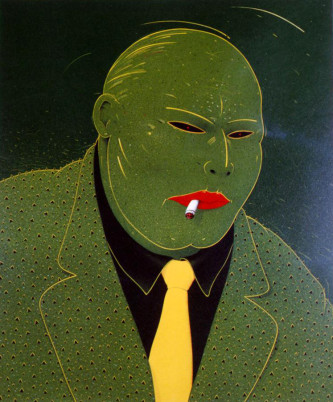
Norman Catherine
Marther Rosler said people prefer the fake. A good many people in the West today grow up watching Nature shows on TV and thinking that IS nature, and they watch Jamie Foxx do Ray Charles and Joaquin Phoenix do Johnny Cash and Will Smith do Ali, and Beyonce do radical chic circa 2016. These are obvious examples, finally. But they are attached to the deeper questions that are part of this ideological fabric. And this is why one is both sympathetic to much of the left and their stunning bad taste in terms of art, and their tendency toward a kind of positivist correction of that jargon of authenticity. The jargon of hyper-pragmatic Hayakesque scientism is just as harmful, but seems always to get a tacit pass these days. But maybe because there are just fewer popularizers of positivist thought.
After WW2 science in the U.S. was essentially funded by the military. This relationship lasted at least until the end of the 80s and one could argue it still exists in large measure. The birth of ‘science management’. The problem for the U.S. was that the military was an organ of rabid anti communism and aggressive Imperialism. For after all the Soviet Union also organized a science management system. And so did Hitler for that matter. But the point is in the US science really never partnered with industry so much as with the military, and then through that channel, with industry. This has changed somewhat over the last thirty years with Silicon Valley and the information industry, but the signal foundational experience for post WW2 *thinkers* was the development of the ‘think tank’. And that meant RAND, and that was staffed with former Carnap types (as one early RAND expert put it) because such thinkers were easily transformed into operation researchers. So institutional/government/military think tanks were always going to favor disciplined but uncreative empiricists. And it is maybe that which many on the left today might want to remember. The positivists were trending toward a representation of a *certain* idea of the material. And the rise of French post structuralists tended toward a certain justification for not caring about material reality…not to mention that they became self parody all too quickly. What was once the climate that gave birth to Sarte and later Debord and May 69 became the clowning of post Derridean deconstructionists.
Shaun Goldfinch, Kiyoshi Yamamoto wrote that the post war think tank environment fostered a climate that favored measurement over critical judgement. It was inherently reactionary and very consciously (in the case of RAND) designed to fight communism. One of the curious aspects of perception …looking back…regarding intellectuals in the U.S. is that that erotic artistic energy of late modernism, the Ab Ex painters, Black Mountain college, and avant garde jazz was overtaken by the sex negative repressed button down ivy league positivists of think tank world. The signaled the first salvo against arts education, and fostered a climate of anti art feeling. At the same time, the Soviet Union loomed in the western imagination as monochrome and dark, authoritarian and paranoid. In fact the eastern bloc countries always exhibited a good deal more sexual buzz than the WASP white egg heads that strolled the corridors of RAND (originally an offshoot of Douglas aircraft), Carnegie Endowment for Peace, Brookings, the Cato Institute, and the Heritage Foundation. This was the contradictory core of a shaping of perception in the U.S. that intensified hugely after the end of the Vietnam War. This was the moment cool was retrofitted to NASA, the best and brightest and the premier example of this was Tom Wolfe’s The Right Stuff. Liberal America LOVED The Right Stuff. In fact I might argue that no single book terminated the energy of the sixties as much, finally, as The Right Stuff.

Johnniac computer, 1954. RAND corporation.
The sense one gets of this control of narrative and shaping of perception, in the West, and in particular on University campuses as it happened after Vietnam, (the Wolfe book was 79) was that dissent was fractured, the hippies had retreated, and many had taken a personal self improvement path (EST, Essalen, Omega, whatever), and this fracture allowed for siphoning from the right. Couple this to computer technologies, and the rise of a branch of research connected to it, and the organized dissent and resistance of the sixties had both gone interior and private, or it had been leached into the system one protested against. And additionally, there was the systematic FBI assault on black radicals. The literal extermination of the Panthers. And labor’s capitulation to management.
Now, Adorno debated Arnold Gehlan, in the sixties, in Germany. Gehlan was actually a former member of the Nazi party, and reactionary. And this passage is, I think, fascinating…and Fabien Freyenhagen quotes it in his book on Adorno….
When asked about human potential, Adorno said:
“Well, I do not know positively what this potential is, but I know
from all sorts of findings – including the particular findings of the
sciences – that the adjustment processes, which human beings are
subjected to nowadays, lead to an unprecedented extent – and I think that
you would admit this – to the crippling of human beings. Take for
example an issue about which you have thought extensively, namely,
technical talent. You tend towards saying – and Verblen also held this
thesis – that there is something like an instinct of workmanship, thus that
there is a kind of technical-anthropological instinct. Whether or not this
is the case, I find difficult to decide. But what I do know, is that today there
are uncounted human beings, whose relationship to technology is, if I
may use a clinical term, neurotic, that is, they are tied non-reflectively
to technology, to all sorts of means to control life, because [their]
purposes – namely, a fulfilment of their own lives and of their own vital
needs – is largely denied to them.”

Interior of Saint Barbara, coptic church, old Cairo.
This is key …’unreflectively tied to technology’ — the neurotic and unreflective. The post sixties in the West, especially in the U.S. was the rationalizing of consumer reflex. Buying is impulse related. Marketing made a science of encouraging the non reflective in daily life. The popularity of films about this era (Mad Men for one) is hardly surprising. Make heroic those button downed white men who might just as easily have worked for Brookings or RAND. The research programs increasingly resembled marketing strategies, and through all of it the former left protest movement looked for solutions in a variety of new age mysticism. Although I often think today that many are too harsh about those new age movements and pseudo religious communities or courses or events. And before I get into that, remember — this is why I brought up the early Christian mystics, the deeply reflective meditative monastic visionaries of the tenth, eleventh, and twelfth centuries. The early killing floor for Christian guilt. The base station on a time line that leads towards the 21 century and a nation of jabbering chimps, or trained seals. Applaud Beyonce (who is preparing for her sold out performances in Israel) and uncritically embrace the most craven jingoism.

Xu Zhen
Adorno believed we could not know what the good is — the good society. Marcuse, too, said, we cannot know what a non-repressed society would look like. But, like climate change, and if one lives near the arctic circle, as I do, you soon realize the significance of one or two degrees. Well, Adorno said probably the good would be almost the same, but with only a very tiny difference. But that difference, like two degrees of warming, that would still be profound. And as Adorno never tired of pointing out, the rational is what the good will look like, it is not what one sees at the Cato Institute. For that is the negation of rationality.
This is the heart of what I wanted to get at here. When critics accuse thinkers of lacking rigor or being un-empirical, there is rarely if ever an investigation of what those terms mean. And I think Adorno is particularly relevant regards this. For he believed that empirical cognition was a composite of concepts. And that our sensory experience was filtered through this composite. In other words, as Freyenhagen puts it; cognition becomes a process of identification. Of assigning the particular to a category or class under or in which it fits. We do not cognise the thing itself. This is very Kantian, and fits closely to the ‘forms of intuition’. Society shapes our processing of experience, and our thought. And increasingly, in an age of marketing, this societal historical shaping is given a universal character. Now, this leads into a very difficult part of Adorno’s philosophy, that regarding the non-identical. Without going into great length, and for the purposes of this posting, the non-identical is that which is necessarily missed when cognition processes experience through this conceptual mental apparatus. And that such conceptual analysis always misses something identical to the thing itself. Partly, this is why humans, rational conceptual humans in human society, create artworks and stories and music and dance. In artworks the subject relies on mimesis before concepts.
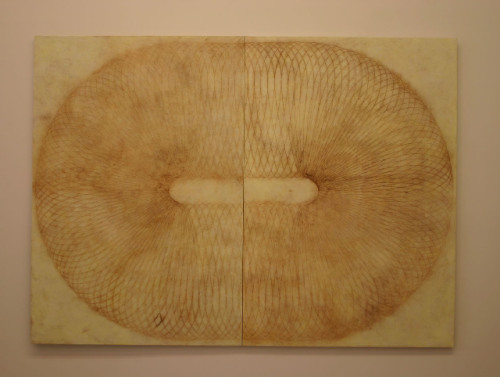
Al Held
The world is, following this logic, impossible to fully access. And hence when the cry for more empirical theorizing arises, the idea is a highly mediated one, at best. For science is simply transcribing its own set of conceptual indexes and then extrapolating upon those in a particular way — a scientific system or method of arriving at scientific results or proof. And when such demands are directed at philosophy or even psychology, or sociology, the mediation is different but no less substantial. The culture of Canterbury at the time of Anselm, or the monastic sects in Egypt and Syria between 300 AD and 700 AD, or the hermits who wandered alone, were shaped by a profoundly different life, on a daily basis, but also conceptually had an equally different grounding. And I think it is hard today to try to imagine what those concepts really were.
“Although Egyptian ascetics were occasionally found to self-inflict harm upon their bodies, it was nevertheless mild in contrast to the Syrians, and an exception rather than a rule. The Syrians also aspired to live life as angels in the flesh, emulating the bodiless creatures that live in heaven.”
Jeffrey Conrad
Egyptian and Syrian Asceticism in Late Antiquity
The loss of memory however is only really destructive when it is operative in a system, a society of rational bureaucratic forgetting — organized forgetting. And the one who forgets is forever forgetting, and that non identical trace, though, remains as a reminder. Even if only in some mimetic twitch or subtle unsettled pang of remorse. Today, those experiences are normally simply buried, but when not, when the subject notices — there is resentment. For the U.S. today is so awash in resentment that new terms are needed. Nobody reflects on difference, their own especially. If they do, they end up diagnosed as special needs, or sociopathic, criminal, or just unwholesome. For certain they would be medicated. Americans have absolutely no idea of their own conformity. A conformity so exactly scripted as to most closely resemble a scene in an acting class. Read the lines, remember — for this is the only permissible remembering allowed, and then *act*. And one of the reasons scripted theatre, Shakespeare, or Beckett or Ibsen even, or Strindberg, remains potent, is that memory is occurring in conjunction with a narrative — a poetics of narrative — a small creation of the non identical. However fleeting.
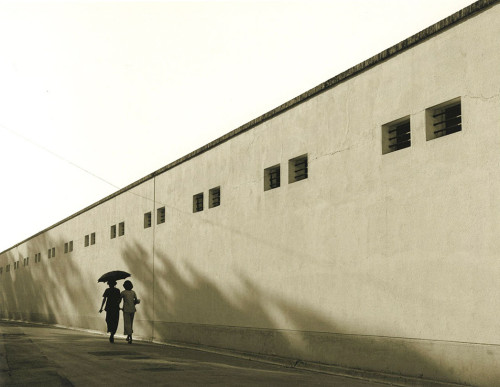
Fan Ho, photography (Paris 1953).
When I hear the philistines complain about minimalist or abstract art I just want to run away. If you cannot grasp why…for example the Al Held above…is great work, and why, say, Lucien Smith is not, then you have missed something very essential in aesthetics. The left is most comfortable with clear messages. Red art. This is only responding to an advertisement you like. It is not really art. Whatever art might be, agit prop is not art. Might even be useful, but its not art. That Held piece is minor but perfect. And finally I cannot fully *explain* why it is. I feel it, the mimetic is so acutely balanced that one knows, on even yet another level, that only experience yeilds that balance. Like calligraphy. Or Bartok’s string quartets, or whatever reaches that state — the Gould playing the Goldberg variations state, there is something that is undeniable in that. And of course there is no word for it.
Freyenhagen writes…. “Adorno seems to think that somehow people will be capable of doing what their situation produces a need in them to do, even if we cannot necessarily anticipate how this will be possible. In this sense, the possibility of recognising the bad depends on whether people will continue to have a need to recognise it or not. Given that the current social world is the realisation of the bad and that this causes misery and suffering, the need to recognise the bad persists. In fact, despite Adorno’s general pessimism about what the administered world makes out of people, he does not think that people’s needs could ever be fully captured and mastered by such a system. In this sense, the continuing disregard of these needs will remain a source for critical questioning, for asking whether this world is really the best there can be.”

James Case Leal
I hear, all the time, maybe even daily, someone say ‘but what can we do?’. The word *do* in that sentence or sentences like that is a magic place holder for nothing. Into that space goes voided self. Only the narcissist asks that question. The actual question is really, what can YOU do, while I wait here. And not even that. What is going to happen, over there, at another time?
Guilt and narcissism. Adult children who pull at the coats of the authority…what can we do? What can we do, sir? More porridge. And you will tell me…you WILL tell me because I deserve to be told.
“The devil is no fool. He can get people feeling about heaven the way they ought to feel about hell. He can make them fear the means of grace the way they do not fear sin. And he does so, not by light but by obscurity, not by realities but by shadows; not by clarity and substance, but by dreams and the creatures of psychosis. And men are so poor in intellect that a few cold chills down their spine will be enough to keep them from ever finding out the truth about anything.”
Thomas Merton
There is something that coalesces around the effects of academic dilution of original texts — that creates a general overriding denial of the idea of work being profound. Derrida was in many ways, as an example, an astute thinker, but his effect, his followers, have reduced his ideas to gibberish. With Lacan it is even worse. One could find a dozen such examples, and the result of this is found in art as well. Nothing must be allowed to have profundity. And popular culture today, and Beyonce and her halftime spectacle serves as a good example, trivializes history. Think of George Jackson and then think of the Super Bowl halftime show.
Jacoby summarizes an aspect of all this when he writes….
“…the utopian vision has flagged; it sparks little
interest. At best, “utopian” is tossed around as a term of
abuse; it suggests that someone is not simply unrealistic but
prone to violence. I offer at least three reasons for the fate of
utopian thought: the collapse of the communist states beginning
in 1989; the widespread belief that nothing distinguishes utopians
and totalitarians; and something more difficult to pinpoint,
but essential: an incremental impoverishment of what might be
called Western imagination.”
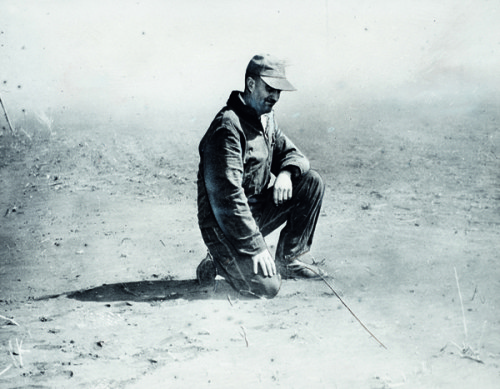
Kansas, 1935. Photographer unknown (David Campany’s A Handful of Dust)
Now, like Preparata, Jacoby suffers from acute intellectual lapses, and a generalizing tendency to contemporary world politics (including a shockingly regressive take on Rwanda), but he does point out another thing worth noting here in the wake of Super Sunday when he quotes Neil Postman who noted a number of years ago that where children once played games by themselves, today American recreation has taken on contours of business, a serious preparation for potential future profit as some variety of professional athlete. And television and social media only reinforce the recruitment of mostly lower income youth for use in the various plantation systems of major league pro sports. And even if not that, childhood is now seen as another realm in need of administration.
There is, despite my admiration for both Jacoby and Preparata, a lingering quality of resentment itself in their writing, and this is not surprising. For everyone is caught up in the eroding of culture and language. And the destruction of the profound is a by-product of positivist thought in general, and of control. Paul Engleman, Wittgenstein’s friend, wrote…
“A whole generation of disciples was able to take Wittgenstein for a positivist because he had something of enormous importance in common with the positivists: he draws the line between what we can speak about and what we must be silent about just as they do. The difference is . . . positivism holds—and this is its essence—that what we can speak about is all that matters in life. Whereas Wittgenstein passionately believes that all that really matters in human life is precisely what, in his view, we must be silent about.”

Roman Vishniac, photography. Krakow, 1938.
Another aspect of the non identical then, the missing affinity. Wittgenstein even wrote a letter to his publisher, before the final draft of the Tractatus, and said, the best half of my work is that which isn’t written here. And, he added, I meant to say that in the preface, but left it out. A double absence.
A society that believes it is driven by desire, for acquisition, and fame, is in fact one, that today, cannot articulate any longer what it desires. For *what* one desires, really, there is no definition. It is, again, the raison d’etre of culture and art. It is fashionable, I think, to see art as fun and pointless. Enjoyable but without real meaning. But to think that means that an awful lot of history has spent an awful lot of energy and time and even suffering to express and build and create the pointless. The sad part is that today, society may well have reached a place where it cannot receive — cannot practice what John Cage called *response-ability*, the responsibility the viewer has, the audience has, to participate in the creation of meaning. The outstanding curator and photography writer David Campany said…“Any art that we think is good seems to us new, at least on on some level. This is so whether it was made five hundred years ago or yesterday. However, very often I suspect the ‘desire for newness’ on the part of many artists, collectors and galleries today is either a function of the marketplace or a symptom of not being, no longer being able to, contemplate the idea of an artwork lasting.” That feeling of newness is mimetic, it is not conceptual. And I still believe it has far reaching implications for social change, even if indirectly.

Robert Burley, photography. (Glenn Gould’s former apartment).
“The moment I begin to speak, I am betrayed by the situation. I am betrayed by whoever listens to me, simply because of communication itself. I am betrayed by my choice of words.”
Jean Genet
The culture wars are subsumed, rather obviously, in class war. Which is not to say that elements of what is referred to as the culture wars, does not have meaning, because it does. I tried to address that a bit above. But I want to conclude this with a long(ish) quote from an interview (well, two interviews) with Jean Genet.
“In terms of the United States, and perhaps on an even larger scale, it is this party, this revolutionary movement that is most capable, when it succeeds,
of provoking an explosion of joy and liberation, an explosion already prefigured in some ways by the events of May in France. Therefore, wherever I am, I will always feel connected to any movement that will provoke the liberation of men. Here and now, it is the Black Panther Party; and I am here by their side because I am on their side. Since I have known them, I have not ceased discovering in them this freedom and this exchange of fraternal tenderness. Now that I’ve said this to you, do you understand why I am anxious when a man like Bobby Seale is about to be extradited, when, along with fourteen of his comrades, he is in danger of an extremely harsh sentence? When he may be facing death?’ It is not the entire United States, but the business and finance concerns in power who will do anything to destroy the Black Panther Party, to prevent the liberation of men who live entirely under the domination of the dollar and the dollar’s machinery. { } Confronted with the artwork, you have to act, as well. The attention you give to the artwork is an act; if I listen to the vespers of the Beata Virgine without at the same time composing it ,with my own, modest means, I’m not doing anything, I don’t hear anything; and If I’m not writing The Brothers Karamazov while I read it, I’m not doing anything. “

Surprised you didn’t bring up the lyrics to Beyonce’s Black Panthers “tribute” song! That’s the fastest and most obvious way to shut anyone who thinks the song is radical, down. Just read:
“When he fuck me good I take his ass to Red Lobster, ’cause I slay
When he fuck me good I take his ass to Red Lobster, ’cause I slay
If he hit it right, I might take him on a flight on my chopper, ’cause I slay
Drop him off at the mall, let him buy some J’s, let him shop up, ’cause I slay
I might get your song played on the radio station, ’cause I slay
I might get your song played on the radio station, ’cause I slay
You just might be a black Bill Gates in the making, ’cause I slay
I just might be a black Bill Gates in the making”
My friend summed it up pretty aptly: “I’m a female sugar daddy and a black white capitalist”